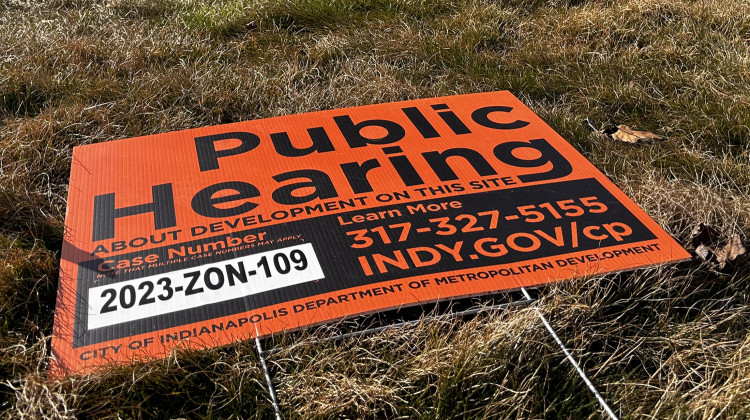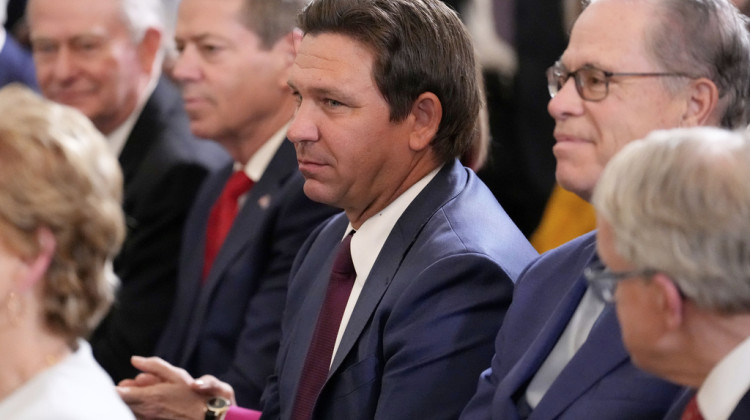
Francis W. Parker School 56 is one of six school buildings that will close at the end of 2022-23.
Amelia Pak-Harvey / ChalkbeatA statewide charter school group has filed a complaint with the state attorney general’s office against Indianapolis Public Schools alleging that the district failed to comply with a state law requiring it to offer unused school buildings to charter schools for $1.
The complaint stems from the district’s passage of its reorganization plan, known as Rebuilding Stronger, which closes six schools at the end of 2022-23 and leaves a seventh building empty when another school moves locations in 2026-27.
At least three charter schools have signaled their intent to occupy some of these buildings, but IPS officials have said they hope to keep the facilities by lobbying state lawmakers to give the district flexibility under the law.
The Indiana Charter School Network said on Thursday that it filed complaints regarding Floro Torrence School 83, Frances Bellamy Preschool Center, George Buck School 94, Raymond Brandes School 65, Francis Parker School 56, and Paul Miller School 114, all of which will close in 2023.
Marcie Brown-Carter, executive director of the network, said the group is also considering a complaint for the Sidener Academy for High Ability building. Sidener students will relocate to a new building at the site of the former Joyce Kilmer School 69 in 2026-27.
The complaints claim that the school board failed to alert the state Department of Education of its available buildings slated for closure within 10 days of voting to close the schools on Nov. 17, as required by law. The network also alleges that the board failed to seek a certification that the district complied with the law within 15 days of the vote, as required by state statute. The law requires such certification if a school board passes a resolution to “sell, exchange, lease, demolish, hold without operation, or dispose of a school building.”
The Rebuilding Stronger plan creates four enrollment zones, reconfigures grades, and offers special programming at more schools.
“If the law were being followed, charter schools would currently be able to publicly request to use those buildings for future classroom use,” Brown-Carter said in a statement. “We look forward to the attorney general’s review of the complaints. All we are seeking is compliance with the law.”
IPS said in a statement that the buildings may have a number of future uses, including administrative offices, training facilities for professional development, or emergency response training, as outlined in the Rebuilding Stronger resolution approved by the board.
Innovation schools, which are autonomous schools within the district, could also use the buildings under an innovation agreement, the district said.
“We want to be very clear that until the end of the school year, there are students and teachers in all of our proposed consolidated buildings, and we will remain focused on ensuring they are well-supported through that time,” the district said.
The $1 law is one of two heated topics the district is contending with as it faces pushback from the charter school community amid its Rebuilding Stronger plan. Charter schools are also pushing for the district to share more of the money it will receive if voters approve a $413.6 operating referendum in May.
The state law — commonly known as the $1 law — requires school districts to offer “vacant or unused” buildings previously used for classroom instruction to charter schools or state educational institutions for sale or lease at $1.
Within 10 days of passing a resolution to “close, no longer use, or no longer occupy” a school building, the district must notify the state, which must then alert charter schools of the building’s availability.
The attorney general’s office can investigate complaints against school districts that fail to comply with the law.
The state Department of Education spokesperson confirmed earlier this month that it had “not received notification from [IPS] of any plans to close, no longer use, or no longer occupy a school building.”
“The Board has committed to a transparent decision-making process that will occur prior to the end of the school year and consider the input of our community,” the district said in a statement. “In all matters, our students and families are our priority. We will continue to work in partnership with our community to determine how we can best meet the many needs that exist.”
Attorney general has had other complaints
Rulings from the attorney general on previous complaints over the $1 law have varied.
A charter school hoping to open in Carmel sued the Carmel Clay School Board in April, alleging the district violated the law by planning to partner with the city parks department to explore the potential reuse of a closing elementary school building.
But the attorney general’s office had already concluded that the district was not in violation of the law since the building was still occupied by the district.
In December 2021, the South Bend Community School Corporation also faced two complaints alleging that the district failed to list its Brown Intermediate Center and Hamilton Elementary School with the state as available for acquisition.
The attorney general’s office concluded that the district was using the Brown building and did not have to give it up, but must list the Hamilton building.
Funding questions could dominate session
The $1 law and referendum funding could play heavily in discussions in the upcoming legislative session, which begins in January.
The district hopes voters will pass two ballot questions, totaling up to $823.6 million, to fund Rebuilding Stronger — which also expands prekindergarten and specialized academic programs throughout the district.
Charter schools are hoping to get a bigger slice of that funding. While the district has said it will share those funds with charter schools in its innovation network, it will not share with independent charters over concerns of accountability.
A bill that would have given IPS an exemption from the $1 law while requiring school districts to share referendum tax dollars with charter schools failed to pass in the last legislative session.
Amelia Pak-Harvey covers Indianapolis and Marion County schools for Chalkbeat Indiana. Contact Amelia at apak-harvey@chalkbeat.org.
 DONATE
DONATE






 Support WFYI. We can't do it without you.
Support WFYI. We can't do it without you.